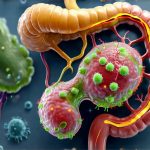The human gut – often referred to as our ‘second brain’ – is far more than just a digestive tract. It’s a complex ecosystem teeming with trillions of microorganisms, collectively known as the gut microbiota. This diverse community, encompassing bacteria, archaea, fungi, viruses and other microbes, plays an astonishingly critical role in overall health, extending beyond digestion to influence immunity, mental wellbeing, and even disease susceptibility. Traditionally, medication was viewed as interacting primarily with the human host; however, growing research reveals a fascinating interplay between drugs and our gut microbiota. This interaction significantly impacts how effectively medications are absorbed, metabolized, and ultimately exert their therapeutic effects – and crucially, influences the severity and type of side effects experienced by individuals.
Understanding this relationship isn’t merely academic. It has profound implications for personalized medicine, where treatment strategies can be tailored to an individual’s unique gut microbial composition. Factors like diet, lifestyle, antibiotic use, and genetics profoundly shape our microbiota, creating a highly individualized environment that dictates how we respond to medication. The field of ‘pharmacomicrobiomics’—the study of the relationship between drugs and the gut microbiome—is rapidly evolving, promising more effective and safer therapies in the future. This article delves into the intricate connections between gut microbiota, drug absorption, and adverse reactions, exploring how this dynamic interplay is reshaping our understanding of pharmaceutical interventions.
Drug Absorption & Microbial Modulation
The absorption of a medication isn’t simply about swallowing a pill or receiving an injection. It’s a complex process influenced by numerous factors including the drug’s physicochemical properties, physiological barriers within the gastrointestinal tract, and – crucially – the activity of the gut microbiota. Many drugs administered orally must traverse the intestinal barrier to reach systemic circulation and exert their effects. However, this journey is often far from straightforward. The microbiota significantly alters the bioavailability—the fraction of a drug that reaches systemic circulation unchanged—of numerous medications through several mechanisms.
- Some bacteria can directly metabolize drugs, either activating them into their therapeutic form (prodrug activation) or inactivating them, reducing their efficacy. A prime example is irinotecan, a chemotherapy drug which requires bacterial activation to become its active form, SN-38. Individuals with gut dysbiosis—an imbalance in the microbial community—may have reduced conversion rates, leading to suboptimal treatment outcomes.
- Microbial metabolites can also influence drug absorption by modifying intestinal pH or permeability. For instance, short-chain fatty acids (SCFAs) produced by bacterial fermentation of dietary fiber can enhance intestinal barrier function and potentially alter drug transport.
- Furthermore, the gut microbiota influences gastrointestinal motility, affecting the time a drug spends in the absorptive regions of the intestine. Faster transit times might reduce absorption, while slower transit times could increase it – or conversely, lead to microbial degradation before systemic uptake.
This modulation isn’t always predictable and highlights the individual variability in drug response. What works well for one person may not work as effectively for another due to differences in their gut microbiome composition. This explains why some patients experience significant benefits from a medication while others report little or no improvement, even at standard dosages. The exciting prospect of pre- or probiotic interventions designed to optimize microbial activity and enhance drug efficacy is now gaining traction, representing a promising avenue for personalized pharmacotherapy. Understanding the role of gut movement can also play a part in absorption rates.
Side Effects & Microbial Contribution
While we often focus on the desired therapeutic effects of medications, it’s equally important to understand their potential adverse effects. Increasingly, research suggests that the gut microbiota plays a substantial role in mediating—and even exacerbating—many drug-induced side effects. This is particularly evident with common medications like antibiotics, nonsteroidal anti-inflammatory drugs (NSAIDs), and chemotherapy agents.
Antibiotics, while essential for combating bacterial infections, notoriously disrupt the delicate balance of the gut microbiome. This disruption can lead to a range of adverse effects, including diarrhea, nausea, and abdominal pain, but also more serious consequences like Clostridioides difficile infection. Similarly, NSAIDs are known to cause gastrointestinal damage, and studies suggest that alterations in the gut microbiota contribute to this toxicity by reducing microbial diversity and impairing intestinal barrier function. Chemotherapy agents, designed to target rapidly dividing cancer cells, often inadvertently harm beneficial bacteria in the gut, leading to mucositis (inflammation of the digestive tract), diarrhea, and compromised immune function.
Beyond gastrointestinal side effects, the gut microbiota has been implicated in modulating adverse reactions affecting other organ systems. For example, some chemotherapeutic agents can induce cardiotoxicity – damage to the heart muscle. Recent research suggests that microbial metabolites may influence this process by altering inflammation and oxidative stress within the cardiovascular system. The interplay between drugs, the microbiome, and host immune responses is complex, but it’s becoming increasingly clear that modulating the gut microbiota could potentially mitigate these adverse effects and improve patient tolerance of medications. The role of gut-brain axis also contributes to side effect experiences.
Modulation Strategies & Future Directions
Given the powerful influence of the gut microbiota on drug response and side effects, strategies to modulate microbial composition are emerging as potential adjunct therapies. These approaches can broadly be categorized into: prebiotics, probiotics, synbiotics (combinations of pre- and probiotics), fecal microbiota transplantation (FMT), and even dietary interventions tailored to promote a healthy microbiome.
- Prebiotics – non-digestible fibers that selectively nourish beneficial gut bacteria – can enhance the production of SCFAs, improving intestinal barrier function and potentially increasing drug bioavailability or reducing inflammation.
- Probiotics – live microorganisms administered to confer a health benefit – may help restore microbial diversity after antibiotic treatment or counteract drug-induced dysbiosis. However, probiotic efficacy is strain-specific, meaning that not all probiotics are created equal, and careful selection based on the desired effect is crucial.
- FMT, while currently reserved for severe cases like recurrent C. difficile infection, holds promise as a more comprehensive approach to restoring gut microbial balance in patients experiencing significant drug-related side effects.
The future of pharmacomicrobiomics lies in personalized interventions. Identifying specific microbial signatures associated with drug response and adverse reactions will allow clinicians to tailor treatment strategies based on an individual’s unique microbiome profile. This may involve prescribing specific probiotics or prebiotics alongside medications, adjusting dosages based on predicted metabolic activity, or even designing drugs that are less susceptible to microbial degradation. Advanced sequencing technologies, coupled with sophisticated data analysis techniques, are essential for unlocking the full potential of this field. It’s also important to understand how antibiotics impact gut health and side effects.
The Role of Microbial Metabolites
Microbial metabolites—the substances produced as a result of microbial activity—are key mediators of the drug-microbiota interaction. These metabolites aren’t simply waste products; they actively influence host physiology and play a critical role in shaping drug effects. SCFAs, as mentioned earlier, are perhaps the most well-studied example, but hundreds of other microbial metabolites have been identified with potential pharmacological relevance.
- Tryptophan metabolites, produced through bacterial metabolism of dietary tryptophan, can modulate immune function, neurotransmitter levels, and even gut barrier integrity. Certain drugs may alter the production of these metabolites, impacting their therapeutic effects or contributing to side effects.
- Bile acid modifications by gut bacteria are also significant. Primary bile acids secreted by the liver are converted into secondary bile acids by microbial enzymes, influencing lipid metabolism, immune regulation, and drug absorption.
- Trimethylamine N-oxide (TMAO), a metabolite produced from dietary choline and carnitine by gut bacteria, has been linked to cardiovascular disease risk and may interact with certain medications affecting cholesterol levels or blood pressure.
Understanding the specific metabolites involved in these interactions is crucial for developing targeted interventions. For instance, manipulating the microbiome to increase production of beneficial metabolites like SCFAs or decrease production of harmful metabolites like TMAO could potentially enhance drug efficacy and reduce adverse effects. Metabolomics—the large-scale study of small molecule chemical fingerprints—is becoming increasingly important in unraveling these complex relationships. The link between gut microbiota and overall health is vital to understanding this interplay.
Challenges & Future Research Needs
Despite the rapid progress in pharmacomicrobiomics, significant challenges remain. One major hurdle is the high degree of inter-individual variability in gut microbial composition. Factors like diet, genetics, and environmental exposures contribute to this diversity, making it difficult to establish universal microbial markers for drug response or side effects.
- Standardizing methodologies for microbiome analysis—including sequencing techniques and data processing pipelines—is essential for ensuring reproducibility and comparability across studies.
- Long-term longitudinal studies are needed to understand how the gut microbiota evolves over time in response to medication and how these changes impact health outcomes.
- More research is required to identify specific microbial strains or consortia that can effectively modulate drug metabolism or mitigate adverse effects.
- The development of in vitro models that accurately mimic the complex interactions between drugs, microbes, and human cells will accelerate the discovery process.
Ultimately, integrating pharmacomicrobiomics into clinical practice requires a collaborative effort involving researchers, clinicians, and pharmaceutical companies. By embracing this emerging field, we can move towards a more personalized and effective approach to medication management, optimizing treatment outcomes while minimizing harm to patients. The future of medicine is undeniably intertwined with the health of our gut microbiome. Understanding gut inflammation and its impact on medication efficacy is also critical. Finally, considering the role of gut movement in drug absorption can further refine treatment strategies.


















